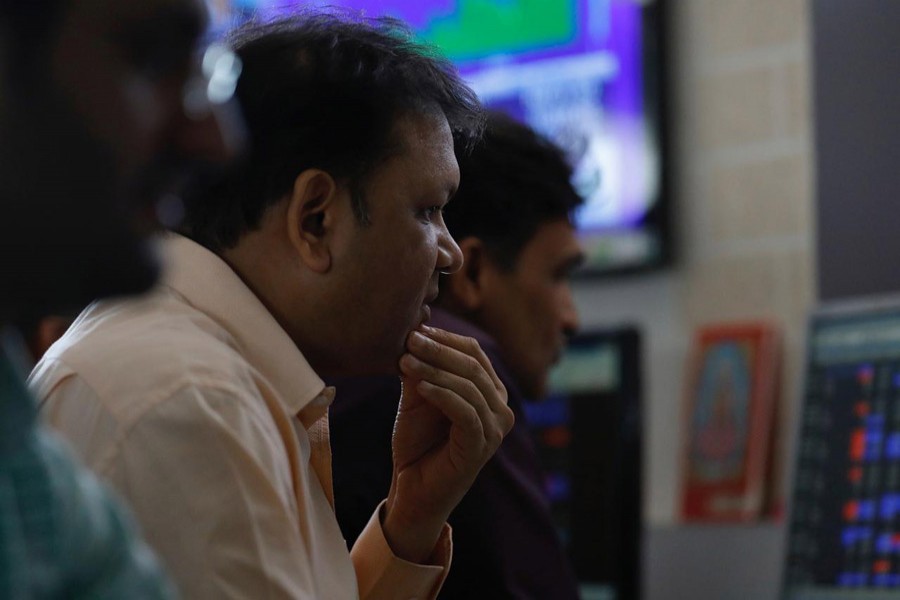Bangladesh's capital market has hit a purple patch after a prolonged bearish spell as the country's premier bourse capped a tenth successive week of gains amid renewed optimism and confidence from investors.
The DSEX, the main index of the Dhaka Stock Exchange, closed the week at almost 4,900 points to maintain an upward momentum, having plunged below 4,000 points in the early months of the pandemic.
At one point in June, trading on the country's premier bourse sank to its lowest level in 13 years on Jun 21 with a turnover of less than Tk 500 million as investors largely stayed away. But the market has returned to a bullish trend, with a daily turnover of more than Tk 8.28 billion last week.
But with the country's economy still reeling from the impact of a raging coronavirus pandemic, how has the stock market been able to pull off such a turnaround?
Analysts believe the upturn has been sparked by a more hands-on approach from the Bangladesh Securities and Exchange Commission.
Lower lending rates at banks have also spurred investment in the capital market, according to Ahmad Rashid Lali, former president of DSE Brokers Association of Bangladesh.
"The stock market regulator took the initiative to work closely with Bangladesh Bank and other regulators which wasn't the case previously. Therefore, there aren't as many obstacles as before. In the past, there were occasional policies that hindered the capital market."
After the liquidity crisis in the capital market in 2018, the central bank moved to reduce the loan-to-deposit ratio. But the move hamstrung the investment capacity of banks in the market which in turn saw interest rates climb. It marked the start of the crisis in the stock market.
In a bid to stem the rut, banks were allowed to set up special funds to invest in the capital market.
But in the meantime, the coronavirus pandemic wreaked havoc on the country's economy, compounding the woes of the crisis-ridden stock market.
As the broad indices of the two bourses went into freefall, the regulator intervened by changing the circuit breaker rules to introduce a floor price mechanism. But while the measure was enough to arrest the slump, it failed to attract investment in shares.
In all, the DSEX shed 2,000 points between the start of 2018 and June this year.
But the market began to rally towards the end of July. In the last 10 weeks, the key index has gained more than 900 points.
Sharif Anwar Hossain, president of DSE Brokers Association of Bangladesh, pointed out that as the capital market struggled to regain its footing, share prices fell dramatically. This, according to him, was a good time for investors to enter the fray and they made the most of the opportunity, helping restore 'confidence' in the market along the way.
Mohammad A Hafiz, former president of the Merchant Bankers' Association and director of AAA Finance and Investment Limited, also spoke about the market regaining the people's confidence.
"Confidence works like magic in the capital market. When there was a lack of confidence, there wasn't any money going around. But as people's confidence has grown, they are now investing in shares again," he said.
Lali expanded on how the capital market regained investors' trust. He pointed out that the BSEC had previously made a rule which required a person to be a 2.0 per cent shareholder in a company to become its director while all its directors must hold a combined 30 per cent stake in the company.
"The commission has now set a timeline to implement the measures. This has increased people's confidence in the capital market. ”
Lali believes the reduction of interest rates has also drawn investors to the capital market.
"The interest rate on bank deposits is now 6.0 per cent and the lending rate is 9.0 per cent. There is no liquidity crisis in the banking sector. This has had two positive effects on the capital market as banks are also investing now.”
Highlighting the return of big investors to the capital market, he added, “They hadn't invested in the capital market for a long time. Now they are slowly coming back. ”
As things stand, Lali is confident that the situation in the capital market will only improve if it is allowed to move at its own pace.
"The Securities and Exchange Commission must see that no-one in the capital market manipulates share prices and that there is good governance in the listed companies. If this is ensured then the capital market will be able to maintain this momentum."


